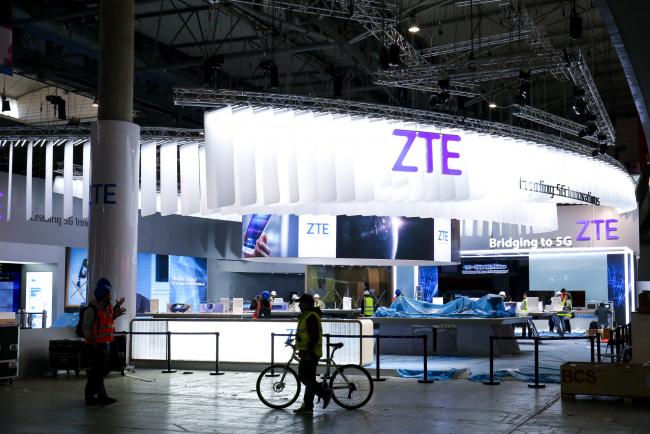(Bloomberg) -- ZTE Corp. has suspended all major activities after the U.S. crippled its ability to buy crucial American technology, signaling the potential collapse of one of the world’s largest makers of phones and networking gear.
China’s No. 2 telecom equipment maker said it remains intent on resolving a seven-year blockade Washington imposed as punishment for violating the terms of a 2017 sanctions settlement, then lying about it. That however cut off access to the components it needs to build most of its products, from Qualcomm (NASDAQ:QCOM) Inc.’s semiconductors to optical chips from Lumentum Holdings Inc.
ZTE essentially ran out of inventory in the month since the ban’s imposition and then had no way to replenish it. As of Thursday, its website and flagship smartphone store on Alibaba’s Tmall online marketplace had suspended sales. Carriers, including Australia’s Telstra Corp., stopped offering its devices. And ZTE’s larger telecom gear-making operation probably ran afoul of the same component shortages, said Huang Leping, an analyst with CICC.
“There is nothing ZTE can do now,” Huang said. “Its manufacturing and sales are paralyzed, but R&D is still going on.”
The blow came just as ZTE was preparing to lead the country’s charge into the era of fifth-generation wireless technology, along with local rival Huawei Technologies Co. Major wireless carriers around the world are preparing to spend billions rolling out 5G networks, which enable new technologies from faster internet access to augmented reality. ZTE, which once harbored ambitions of vying with Apple Inc (NASDAQ:AAPL). in phones, has called the punishment “unacceptable” and threatened to take legal action.
ZTE, whose shares have been suspended since the imposition of the ban, said in its statement it has sufficient cash and will adhere to its commercial obligations. Company representatives declined to elaborate further.
“As a result of the denial order, the major operating activities of the company have ceased,” ZTE said in a filing to the exchange. “The company and related parties are actively communicating with the relevant U.S. government departments in order to facilitate the modification or reversal of the denial order by the U.S. government and forge a positive outcome in the development of the matters.”
ZTE’s best hope may be for intervention from Beijing -- but that is a long shot given rising tensions between the U.S. and China. President Donald Trump has threatened tariffs on $150 billion of Chinese imports for alleged violations of intellectual property rights, while Beijing has vowed to retaliate on everything from American soybeans to planes.
ZTE’s larger rival, Huawei, also faces heightened U.S. opposition. The justice department is said to be investigating its own compliance with American sanctions banning sales to Iran. The Pentagon has banned ZTE and Huawei phones for sale, and the Federal Communications Commission voted in April to ban federal funds from being used to buy gear from companies deemed a national security risk.
To contact Bloomberg News staff for this story: Gao Yuan in Beijing at ygao199@bloomberg.net;Dominic Lau in Hong Kong at dlau92@bloomberg.net
To contact the editors responsible for this story: Robert Fenner at rfenner@bloomberg.net, Peter Elstrom, Edwin Chan
©2018 Bloomberg L.P.
